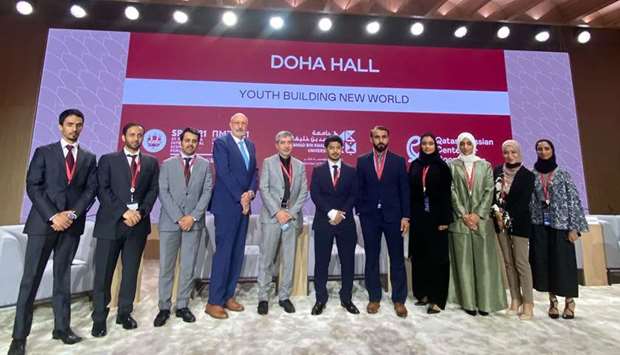Hamad Bin Khalifa University (HBKU), strengthened its global positioning through contributions to the strategic knowledge exchanges at the 24th St. Petersburg International Economic Forum (SPIEF).
HBKU’s senior leadership and graduate students showcased the university’s research achievements, multidisciplinary programmes, and potential exchange opportunities at its booth in the Qatar Pavilion, and were among key speakers on several panels and sessions.
On June 3, Dr Ahmad M Hasnah, HBKU president, participated in a prominent panel titled The Pros and Cons of Cultural Expansion. The discussions between high-level government officials, and leaders in culture, media, and the arts examined how trends in the projection and promotion of culture might bring people together, and also the risks of creating further divisions.
Dr Mounir Hamdi, founding dean of the College of Science and Engineering, spoke at The Frontiers of Humanity as Defined by Science and Life on June 4. Representatives of some of Russia’s leading scientific research institutes discussed to what degree growth and development are compatible with concerns surrounding the environment, the economy, and society, and whether we can peacefully coexist with nature and reduce the human burden.
With June 5 focusing on the education and youth agenda, the Qatar Pavilion brought together participants to discuss the most prominent topics for today’s youth, including accessible and high-quality education, leadership, engagement in solving global issues, and others. Dr Hasnah, Dr Michael J Benedik, HBKU provost, and Dr Hamdi, and Dr Marc joined heads of Qatari and Russian universities at the educational business breakfast University between Global Challenges and Local Commitments, which considered changes in higher education systems and the strengths and weaknesses revealed by the pandemic.
As part of the International Youth Economic Forum, HBKU led the international dialogue Youth Building a New World in the Qatar Pavilion, with Dr Benedik contributing to discussions on how to support the meaningful participation of youth in policy and decision-making. Dr Hasnah also shared HBKU’s efforts to encourage youth entrepreneurship through an innovative research ecosystem, and the value of social entrepreneurship, at a panel discussion Youth Entrepreneurship: Empty Hype or the Future of the Russian Economy?
Speaking at the panel discussion, Dr Hasnah said, “Youth entrepreneurship has the ability to create new markets. The role of governments, educators, and investors is to provide the training, policies, innovative ecosystem, and access to business expansion to empower the youth and enable them to create the jobs of the future.”
On June 3, Dr Ahmad M Hasnah, HBKU president, participated in a prominent panel titled The Pros and Cons of Cultural Expansion. The discussions between high-level government officials, and leaders in culture, media, and the arts examined how trends in the projection and promotion of culture might bring people together, and also the risks of creating further divisions.
Dr Mounir Hamdi, founding dean of the College of Science and Engineering, spoke at The Frontiers of Humanity as Defined by Science and Life on June 4. Representatives of some of Russia’s leading scientific research institutes discussed to what degree growth and development are compatible with concerns surrounding the environment, the economy, and society, and whether we can peacefully coexist with nature and reduce the human burden.
With June 5 focusing on the education and youth agenda, the Qatar Pavilion brought together participants to discuss the most prominent topics for today’s youth, including accessible and high-quality education, leadership, engagement in solving global issues, and others. Dr Hasnah, Dr Michael J Benedik, HBKU provost, and Dr Hamdi, and Dr Marc joined heads of Qatari and Russian universities at the educational business breakfast University between Global Challenges and Local Commitments, which considered changes in higher education systems and the strengths and weaknesses revealed by the pandemic.
As part of the International Youth Economic Forum, HBKU led the international dialogue Youth Building a New World in the Qatar Pavilion, with Dr Benedik contributing to discussions on how to support the meaningful participation of youth in policy and decision-making. Dr Hasnah also shared HBKU’s efforts to encourage youth entrepreneurship through an innovative research ecosystem, and the value of social entrepreneurship, at a panel discussion Youth Entrepreneurship: Empty Hype or the Future of the Russian Economy?
Speaking at the panel discussion, Dr Hasnah said, “Youth entrepreneurship has the ability to create new markets. The role of governments, educators, and investors is to provide the training, policies, innovative ecosystem, and access to business expansion to empower the youth and enable them to create the jobs of the future.”

